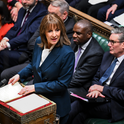Mental illness has been a topic of growing political and public concern over recent years, especially since Theresa May identified poor quality mental health service provision as one of the “burning injustices” she pledged her government would fight in her first speech outside No 10.
Events—both unforeseen but also of her own making—have since overtaken her efforts to take constructive action to address this issue. Yet the scale of the crisis in both adult and children’s service provision continues to grow.
Spending on adult mental health services by both local authorities and NHS trusts has fallen significantly in real terms since 2010, while a third of services for children have been reduced in scale or closed altogether over the same period. A survey of NHS trusts in England last month found that 80 per cent of managers polled fear they will not have enough resources this year to provide swift, high-quality mental health support given rising demand for services.
Against this backdrop, it is not feasible simply to focus on improving the quality of care offered to those in need of support. There must be a parallel emphasis on slowing the pipeline of new cases.
To achieve this, special attention must be given to the mental health and wellbeing of the UK’s young people. It is estimated that three quarters of adult mental health problems begin before the age of 18. Preventing these problems occurring at this young age, or limiting their severity, offers a route to improved mental health among the adult population further down the line.
“The government should signal a willingness to impose a duty on the turnover of social media companies, to fund mental health support”Yet in the face of rising caseloads and budget cuts, priority is being given to treating young people who have already developed a severe difficulty. Only 16 per cent of annual spending on children and young people’s mental health goes on community-based early intervention services.
Pivoting towards an early intervention approach will require both structural and policy reforms. In ResPublica’s latest report, "Making Young Minds Matter," supported by leading children’s charity Barnardo’s, we set out what these reforms could look like. We recommend five key changes.
First, more collaborative working between charities and local authorities. The voluntary sector can provide valuable insights into the changes needed in the local support ecosystem to achieve effective early intervention, as a result of its frontline work. Commissioners must be open to allowing service providers to co-design services to harness this.
Second, long-term funding certainty for local government. The charity YoungMinds has found that 60 per cent of councils cut or froze their Child and Adolescent Mental Health Services budgets between 2010 and 2014, a period over which local authorities saw their funding from government cut by around 40 per cent. This has meant more young people facing delays in accessing specialist treatment, even denial of access to it altogether, allowing their symptoms to escalate. It is estimated that over a quarter of young people referred to CAMHS across England in 2015 were not allocated treatment.
Third, further devolution within England. As our report describes, the unique depth and scope of Greater Manchester’s devolution settlement has allowed the region to go further than other areas in public service reform, including when it comes to early intervention. With a hung parliament and Brexit drawing heavily on Westminster’s time and energy, local authorities have a critical role to play in driving this agenda across the country, a task which would be helped along by equivalent Greater Manchester-style powers.
Fourth, create a network of informed individuals around young people, able to spot and quickly act on signs of poor mental health. We recommend that the government fund counselling services in all primary and secondary schools in England. The government’s announcement of funding to train teachers in mental health awareness meanwhile should be built on, by providing similar training to prospective foster families, voluntary sector staff working with vulnerable young people, and professionals working with children who are known to be particularly at risk of mental health issues (such as children in care).
Fifth, investment in technology as part of mental health support. Local authorities should be supported in developing online counterparts to face-to-face services, which could provide advice and information as well as on-demand therapy. In recognition of recent evidence around the potential negative impact of social media on children’s mental health, government should also work with social media companies to create a fund to invest in digital mental health support. Ideally this fund would consist of voluntary contributions by these companies, match-funded by government, but government should also signal a willingness to impose a duty on their turnover for this purpose.
We believe that the increasing acknowledgement of mental health difficulties among young people—across all political parties but also among the general public—makes this a critical moment for decisive action. Even if austerity is eased somewhat, resources in the mental health sector will remain stretched for the foreseeable future, while the upturn in demand for support shows no sign of abating.
Addressing mental ill health at its root causes and at the earliest opportunity is, we believe, the only sustainable way to tackle this intensifying crisis.












